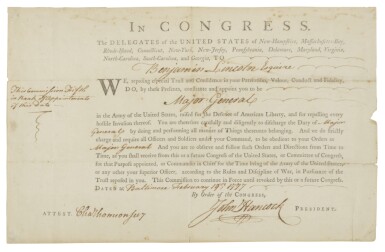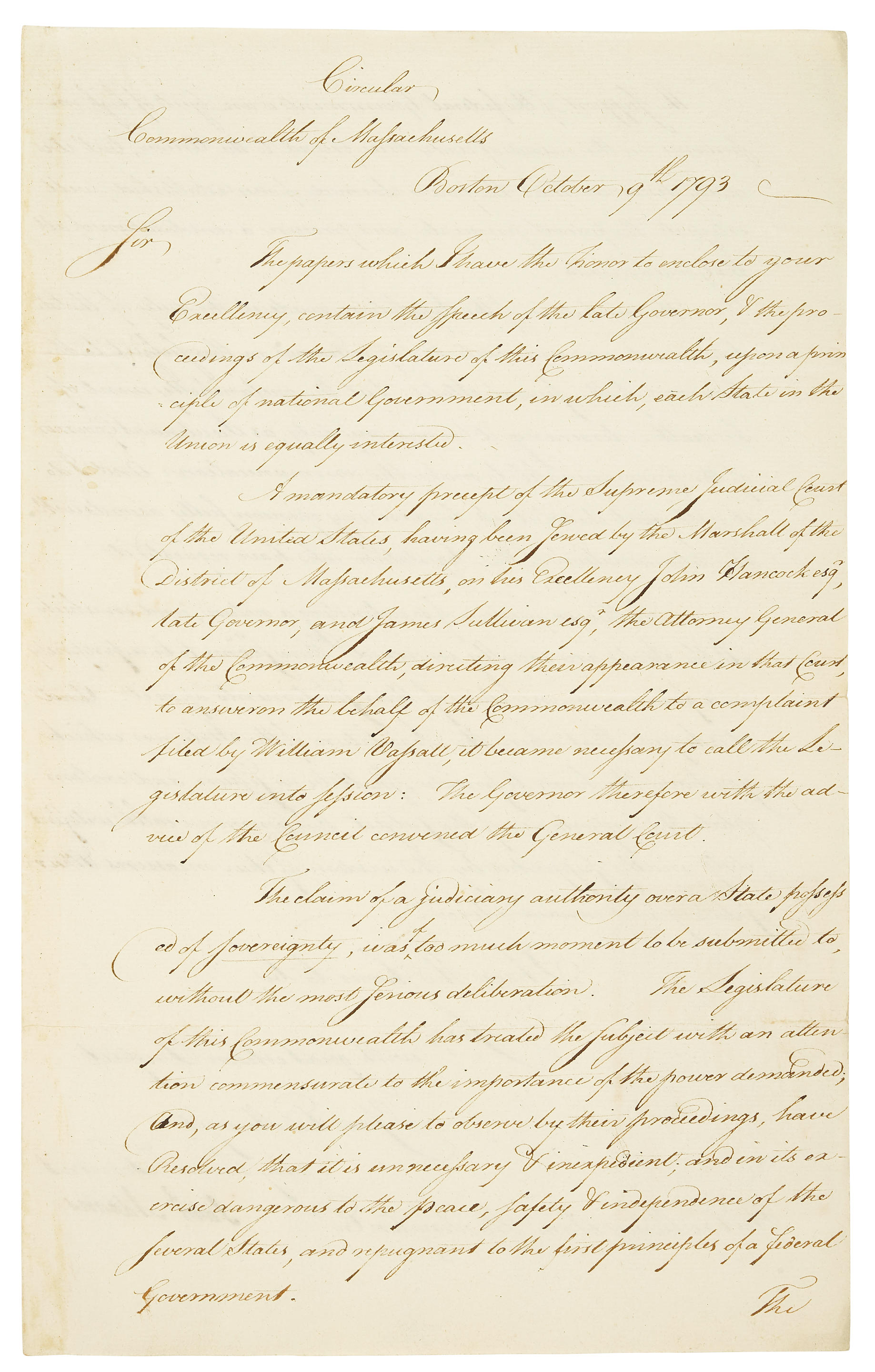Hancock, JohnPrinted broadside signed ("John Hancock") as a Selectman of Boston, denouncing taxes "imposed upon the People, without their Consent"
Broadside circular letter (318 x 162 mm) on paper, [Boston, no printer], 14 September 1768, sent by the Selectmen of Boston to the Selectmen of various Massachusetts towns, transmitting the resolves of the town meeting held on September 12, and requesting that representatives be sent to a convention at Boston on September 22, to consider what measures should be adopted to obtain redress of grievances against Great Britain, this copy directed to the Selectmen of Charlestown, also signed by four other Boston Selectmen (Joseph Jackson John Ruddock, John Rowe, and Samuel Pemberton), with the notation that two others were out of the province; lower left corner restored not affecting text.
Taxation without representation: A scarce and vital broadside foreshadowing the American Revolution as John Hancock and Boston's other Selectmen rally opposition to the Townshend Acts and taxes "imposed upon the People, without their Consent."
Because of the sporadic enforcement of, and American opposition to, the Stamp Act and the Quartering Act, the British Parliament passed in 1767 the Townshend Acts—which imposed duties on lead, paint, paper, glass, and tea and disbanded the New York legislature until it complied with the Quartering Act (forcing colonists to house British soldiers). In February 1768, the Massachusetts Assembly adopted a petition drafted by Samuel Adams and James Otis protesting these new tax duties and calling for a convention of the colonial assemblies to discuss the issue. Before any convention could be held, however, Great Britain ordered the Massachusetts letter revoked and ordered Governor Francis Bernard to dismiss the Assembly. The stark sequel to this series of actions is portrayed in the present circular letter, which explains the background of the colonists' grievances and calls for a provincial convention in just a week's time.
"You are already too well acquainted with the melancholly and very alarming Circumstances to which this Province, as well as America in general, is now reduced. Taxes equally detrimental to the Commercial Interests of the Parent Country and her Colonies, are imposed upon the People, without their Consent;—Taxes designed for the Support of the Civil Government in the Colonies, in a Manner clearly unconstitutional, and contrary to that, in which 'till of late, Government has been supported, by the free Gift of the Standing Army; not for the Defence of the newly acquired Territories, but for the old Colonies, and in a Time of Peace. The decent, humble, and truly loyal Applications and Petitions from the Representatives of this Province for the Redress of these heavy and very threatning Grievances, have hitherto been ineffectual, being assured from authentick Intelligence that they have not yet reach'd the royal Ear: The only Effect of transmitting these Applications hitherto perceivable, has been a Mandate from one of his Majesty's Secretaries of State to the Governor of this Province, to Dissolve the General Assembly, merely because the late House of Representatives refused to Rescind a Resolution of a former House, which imply'd nothing more than a Right in the American Subjects to unite in humble and dutiful Petitions to their gracious Sovereign, when they found themselves aggrieved: This is a Right naturally inherent in every Man, and expressly recognized at the glorious Revolution as the Birthright of an Englishman."
Hancock and the other Selectmen go on to note with trepidation that Governor Bernard, fearing mob violence, has requested that British troops be sent to Boston: "The Design of these Troops, is in every one's Apprehension nothing short of Enforcing by military Power the Execution of Acts of Parliament, in the forming of which the Colonies have not, and cannot have any constitutional Influence. This is one of the greatest Distresses to which a free People can be reduced."
The convention called for by the Boston Selectmen was held on 23 to 28 September in Faneuil Hall, with delegates attending from ninety-six Massachusetts towns. On the final day of the convention, British warships arrived in Boston Harbor; two days later, these royal transports unloaded troops at the Long Wharf and began a virtual military occupation of Boston that would last until 17 March 1776.
The present broadside sounds most of the themes that would be more fully developed eight years later in the Declaration of Independence, which Hancock would also sign.
Rare: We are aware of only one other copy being offered at auction since January 1924, and we know of only one other signed copy in private hands. Just six institutions hold copies: the Boston Public Library, the Gilder Lehrman Collection, the New-York Historical Society, Harvard University (Houghton Library), the American Antiquarian Society, and the British National Archives.
REFERENCE:Bristol B2851; Shipton & Mooney, 41799; ESTC W13156; Ford 1430; not in Lowance & Bumgardner
PROVENANCE:Sotheny's New York, 25 May 2016, lot 3 ("Two Centuries of American History"; undesignated consignor)
Hancock, JohnPrinted broadside signed ("John Hancock") as a Selectman of Boston, denouncing taxes "imposed upon the People, without their Consent"
Broadside circular letter (318 x 162 mm) on paper, [Boston, no printer], 14 September 1768, sent by the Selectmen of Boston to the Selectmen of various Massachusetts towns, transmitting the resolves of the town meeting held on September 12, and requesting that representatives be sent to a convention at Boston on September 22, to consider what measures should be adopted to obtain redress of grievances against Great Britain, this copy directed to the Selectmen of Charlestown, also signed by four other Boston Selectmen (Joseph Jackson John Ruddock, John Rowe, and Samuel Pemberton), with the notation that two others were out of the province; lower left corner restored not affecting text.
Taxation without representation: A scarce and vital broadside foreshadowing the American Revolution as John Hancock and Boston's other Selectmen rally opposition to the Townshend Acts and taxes "imposed upon the People, without their Consent."
Because of the sporadic enforcement of, and American opposition to, the Stamp Act and the Quartering Act, the British Parliament passed in 1767 the Townshend Acts—which imposed duties on lead, paint, paper, glass, and tea and disbanded the New York legislature until it complied with the Quartering Act (forcing colonists to house British soldiers). In February 1768, the Massachusetts Assembly adopted a petition drafted by Samuel Adams and James Otis protesting these new tax duties and calling for a convention of the colonial assemblies to discuss the issue. Before any convention could be held, however, Great Britain ordered the Massachusetts letter revoked and ordered Governor Francis Bernard to dismiss the Assembly. The stark sequel to this series of actions is portrayed in the present circular letter, which explains the background of the colonists' grievances and calls for a provincial convention in just a week's time.
"You are already too well acquainted with the melancholly and very alarming Circumstances to which this Province, as well as America in general, is now reduced. Taxes equally detrimental to the Commercial Interests of the Parent Country and her Colonies, are imposed upon the People, without their Consent;—Taxes designed for the Support of the Civil Government in the Colonies, in a Manner clearly unconstitutional, and contrary to that, in which 'till of late, Government has been supported, by the free Gift of the Standing Army; not for the Defence of the newly acquired Territories, but for the old Colonies, and in a Time of Peace. The decent, humble, and truly loyal Applications and Petitions from the Representatives of this Province for the Redress of these heavy and very threatning Grievances, have hitherto been ineffectual, being assured from authentick Intelligence that they have not yet reach'd the royal Ear: The only Effect of transmitting these Applications hitherto perceivable, has been a Mandate from one of his Majesty's Secretaries of State to the Governor of this Province, to Dissolve the General Assembly, merely because the late House of Representatives refused to Rescind a Resolution of a former House, which imply'd nothing more than a Right in the American Subjects to unite in humble and dutiful Petitions to their gracious Sovereign, when they found themselves aggrieved: This is a Right naturally inherent in every Man, and expressly recognized at the glorious Revolution as the Birthright of an Englishman."
Hancock and the other Selectmen go on to note with trepidation that Governor Bernard, fearing mob violence, has requested that British troops be sent to Boston: "The Design of these Troops, is in every one's Apprehension nothing short of Enforcing by military Power the Execution of Acts of Parliament, in the forming of which the Colonies have not, and cannot have any constitutional Influence. This is one of the greatest Distresses to which a free People can be reduced."
The convention called for by the Boston Selectmen was held on 23 to 28 September in Faneuil Hall, with delegates attending from ninety-six Massachusetts towns. On the final day of the convention, British warships arrived in Boston Harbor; two days later, these royal transports unloaded troops at the Long Wharf and began a virtual military occupation of Boston that would last until 17 March 1776.
The present broadside sounds most of the themes that would be more fully developed eight years later in the Declaration of Independence, which Hancock would also sign.
Rare: We are aware of only one other copy being offered at auction since January 1924, and we know of only one other signed copy in private hands. Just six institutions hold copies: the Boston Public Library, the Gilder Lehrman Collection, the New-York Historical Society, Harvard University (Houghton Library), the American Antiquarian Society, and the British National Archives.
REFERENCE:Bristol B2851; Shipton & Mooney, 41799; ESTC W13156; Ford 1430; not in Lowance & Bumgardner
PROVENANCE:Sotheny's New York, 25 May 2016, lot 3 ("Two Centuries of American History"; undesignated consignor)















Testen Sie LotSearch und seine Premium-Features 7 Tage - ohne Kosten!
Lassen Sie sich automatisch über neue Objekte in kommenden Auktionen benachrichtigen.
Suchauftrag anlegen